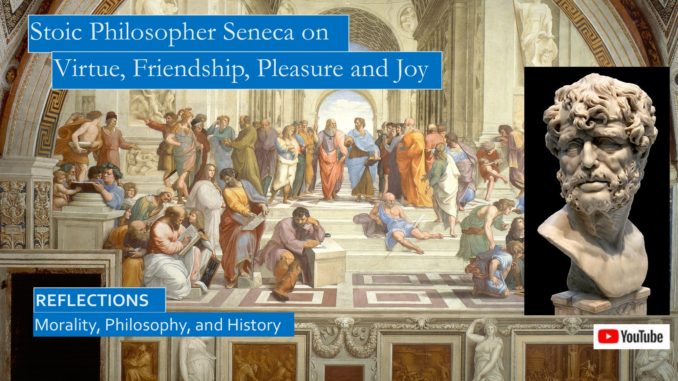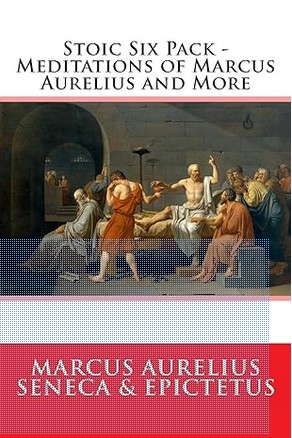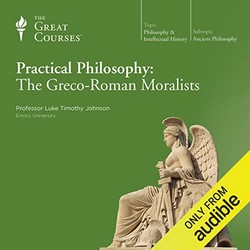
Everybody who reads Seneca finds different treasures, as will you every time you read his discourses. These are some nuggets of wisdom that struck me when reading Seneca.
Seneca reminds us, “Nothing is shut off from the sight of God. He is witness of our souls, he comes into the very midst of our thoughts.” We must be ever vigilant. “I shall keep watching myself continually, I will adopt the habit of reviewing each day.”[1] This reminds us of the verse from St Paul, “we take every thought captive to obey Christ.” Seneca continues, “This is what makes us wicked: that we do not look back on our life. Our thoughts are devoted only to what we are about to do. But yet our plans for the future always depend on our past.”[2]
Seneca Blog 1 http://www.seekingvirtueandwisdom.com/seneca-moral-epistles-blog-1-living-well-dying-well/
Seneca says, “Philosophy teaches us to worship that which is divine, to love that which is human; philosophy has told us that with God lies dominion, and among men, fellowship. This fellowship remained unspoiled for a long time, until avarice tore the community asunder and became the cause of poverty, even among the wealthy, for men cease to possess all things the moment they desire all things for their own.”[3] Selfishness ruins fellowship, selfishness splits communities, selflessness binds men together.
YouTube Video for blogs 4-7, which includes introductory material not in blogs: https://youtu.be/m4mcP2F9c4w
YouTube script with more book links: https://www.slideshare.net/BruceStrom1/seneca-stoic-sayings-on-virtue-friendship-joy-pleasure-and-philosophy
Seneca warns us that lions and tigers can never be tamed, they might lull you into thinking they are like loving kittens, but then the beast in them will go mad, and they roar and pounce on their master. “Vices are never genuinely tamed.” Like lions and tigers, “it is easier to stop vices in the beginning that to control them when they gather force.” “Vices are never genuinely tamed.”[4] “We are in love with our vices, we uphold them and prefer to make excuses for them rather than shake them off.”[5]
Letter LIX On Pleasure and Joy
Seneca tells us that “we Stoics believe that pleasure is a vice.” Like the Church Fathers, Seneca reminds us that we need to overcome many years past of bad habits with many future years of living a godly life. “We are fettered and weakened by many vices; we have wallowed in them for a long time and it is hard for us to be cleansed.”
Seneca asks, “Why does folly hold us with such an insistent grasp? Primarily because we do not combat our vices strongly enough, we do not struggle towards salvation with all our might, we do not trust and drink in the words of the wise with open hearts,” we are not serious in our struggle against our vices, our efforts at living a godly life are but trifles.
Seneca then asks a classic question, “But how much can a man learn in his struggle against his vices, if the time he devotes to learning is only the amount left over from his vices?” That which we worship is that part of our calendar around which the rest of the calendar revolves. Is our weekly worship at the center of our lives, with the rest of our lives scheduled around our spiritual life? Or do we go to church only when church does not conflict with the rest of our calendar? Is all our free time spent in front of the television set? Is our television our God?
“The wise man is never deprived of joy. This joy springs only from the knowledge that you possess the virtues.”[6] If you seek pleasures of all types, “you must know you are as far short of wisdom as you are short of joy.”
Some of Seneca’s sayings remind us that he is indeed a wealthy man, and also that his wealth is often a curse, as when he says that it is often the misfortune of the wealthy man is “he believes men to be his friends when he himself is not a friend to them, and that he deems his favors to be effective in winning friends, although for some men, the more they owe you, the more they hate you. A trifling debt makes a man your debtor; a large debt makes a man your enemy.”[7]
“Money never made a man rich, it always smites men with a greater craving for wealth.”[8] “We are unequal at birth, but are equal in death.”[9]
Other says of Seneca include:
“We should toughen our minds, and remove them far from the allurements of pleasure.”[10]
We will review in a future blog the Great Courses discussions on the Stoic philosophers, one lecture discusses Seneca’s discourses on old age, another his discourses on anger. Seneca says, “It is as foolish to fear death as to fear old age; for death follows old age precisely as old age follows youth.”[11]
On anger, “The outcome of a might anger is madness, and hence anger should be avoided, not merely that we may escape excess, but that we may have a healthy mind.”[12]
A friend may love you, but not everyone who loves you is your friend. Friendship is always helpful, but sometimes love hurts. “Try to perfect yourself so you may learn how to love.”[13]
We will close with a famous Seneca aphorism, “It is not important how long you live, but rather how nobly you live. Often living nobly means you cannot live long.”[14]
[1] https://www.biblegateway.com/passage/?search=2+corinthians+10%3A5&version=NRSVCE
[2] Seneca, “Moral Discourses,” in Stoic Six-Park – Meditations of Marcus Aurelius and More, translated by Richard Gummere, (Enhanced Media, 2014, first published 1925), Letter LXXXII, 396.
[3] Seneca, Moral Discourses, Letter XC, 430.
[4] Seneca, Moral Discourses, Letter LXXXV, 404.
[5] Seneca, Moral Discourses, Letter CXVI, 531.
[6] Seneca, Moral Discourses, Letter LIX, 320-323.
[7] Seneca, Moral Discourses, Letter XIX, 251.
[8] Seneca, Moral Discourses, Letter CXIX. 541.
[9] Seneca, Moral Discourses, Letter XCI, 441.
[10] Seneca, Moral Discourses, Letter LI, 302.
[11] Seneca, Moral Discourses, Letter XXX, 272.
[12] Seneca, Moral Discourses, Letter XVIII, 249.
[13] Seneca, Moral Discourses, Letter XXXV, 279.
[14] Seneca, Moral Discourses, Letter CI, 489.






2 Trackbacks / Pingbacks